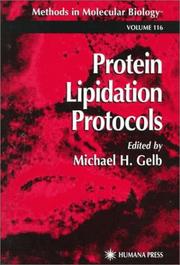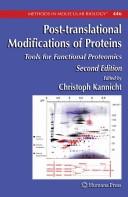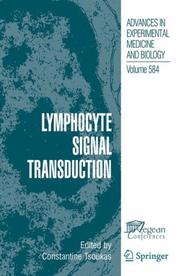| Listing 1 - 10 of 37 | << page >> |
Sort by
|
Book
ISBN: 1839690488 183969047X Year: 2021 Publisher: London : IntechOpen,
Abstract | Keywords | Export | Availability | Bookmark
 Loading...
Loading...Choose an application
- Reference Manager
- EndNote
- RefWorks (Direct export to RefWorks)
Cell metabolism. --- Post-translational modification. --- Co-translational modification --- Cotranslational modification --- Modification, Post-translational --- Post-translation protein modification --- Post-translational protein modification --- Posttranslation protein modification --- Posttranslational modification --- Posttranslational protein modification --- Genetic translation --- Proteins --- Cells --- Metabolism --- Cellular control mechanisms --- Synthesis
Book
ISBN: 9400779194 9400779208 Year: 2014 Publisher: Dordrecht : Springer Netherlands : Imprint: Springer,
Abstract | Keywords | Export | Availability | Bookmark
 Loading...
Loading...Choose an application
- Reference Manager
- EndNote
- RefWorks (Direct export to RefWorks)
This volume focusses on oxidative modifications of lipid molecules and the successive generation of singlet oxygen. The book also covers the secondary adductions of these reactive species with proteins and aminophospholipids. During lipid peroxidation, the initial event is the formation of lipid hydroperoxide, which is followed by an oxidation event that starts a chain-reaction. The formed lipid hydroperoxide gradually decomposes into harmful aldehydes, which are the advanced end-products of lipid peroxidation. The book consists of three sections: Part I, entitled Lipid peroxidation and small molecule adducts focusses on the biochemical events that are involved in lipid peroxidation and to the formation of small molecules like singlet molecular oxygen. This part of the book also introduces the hexanoyl-lysine adduct. Part II, entitled Pathophysiological consequences covers a range of damaging physiological consequences of lipid peroxidation, ranging from atherosclerosis to neurodegenerative disorders. Finally, Part III, entitled Applications for diagnosis and development of functional food looks into potential diagnostic uses of lipid peroxidation, the possible beneficial effects that can be achieved and new assays in food safely that have been developed.
Lipids --- Lipids. --- Peroxidation. --- Lipides --- Lipins --- Lipoids --- Medicine. --- Cancer research. --- Food --- Posttranslational modification. --- Biomedicine. --- Cancer Research. --- Posttranslational Modification. --- Food Science. --- Biotechnology. --- Biomolecules --- Steroids --- Oncology. --- Post-translational modification . --- Food science. --- Science --- Co-translational modification --- Cotranslational modification --- Modification, Post-translational --- Post-translation protein modification --- Post-translational protein modification --- Posttranslation protein modification --- Posttranslational modification --- Posttranslational protein modification --- Genetic translation --- Proteins --- Tumors --- Synthesis --- Food—Biotechnology. --- Cancer research

ISBN: 0896036782 0585403163 9786610821433 1280821434 1592591817 9780896036789 Year: 2002 Volume: 194 Publisher: Totowa, NJ : Humana Press : Imprint: Humana,
Abstract | Keywords | Export | Availability | Bookmark
 Loading...
Loading...Choose an application
- Reference Manager
- EndNote
- RefWorks (Direct export to RefWorks)
The majority of all proteins undergo posttranslational modifications that significantly alter their physical and chemical properties, including their folding and conformation distribution, their stability, and, consequently, their activity and function. In Posttranslational Modifications of Proteins: Tools for Functional Proteomics, Christoph Kannicht and a panel of highly experienced researchers describe readily reproducible methods for detecting and analyzing the most important of these modifications, particularly with regard to protein function, proteome research, and the characterization of pharmaceutical proteins. Among the methods presented are those for analyzing the assignment of disulfide bond sites in proteins, protein N-glycosylation and protein O-glycosylation, and oligosaccharides present at specific single glycosylation sites in a protein. Additional powerful techniques facilitate the analysis of glycosylphosphatidylinositols, lipid modifications, protein phosphorylation and sulfation, protein methylation and acetylation, a-amidation, g-glutamate, isoaspartate, and lysine hydroxylation. Comprehensive and state-of-the-art, Posttranslational Modifications of Proteins: Tools for Functional Proteomics serves as a highly practical guide for all investigators of protein structure-function relationships not only in chemical and pharmaceutical research, but also throughout the rapidly growing field of functional proteomics.
Post-translational modification --- Co-translational modification --- Cotranslational modification --- Modification, Post-translational --- Post-translation protein modification --- Post-translational protein modification --- Posttranslation protein modification --- Posttranslational modification --- Posttranslational protein modification --- Genetic translation --- Proteins --- Synthesis --- Genetic translation. --- Translation (Genetics) --- Life sciences. --- Cell biology. --- Life Sciences. --- Cell Biology. --- Cell biology --- Cellular biology --- Biology --- Cells --- Cytologists --- Biosciences --- Sciences, Life --- Science --- Genetic code --- Genetic regulation --- Cytology.

ISBN: 0896035344 0585238987 9786610830534 1280830530 1592592643 Year: 1999 Publisher: Totowa, NJ : Humana Press : Imprint: Humana,
Abstract | Keywords | Export | Availability | Bookmark
 Loading...
Loading...Choose an application
- Reference Manager
- EndNote
- RefWorks (Direct export to RefWorks)
In Protein Lipidation Protocols, Michael Gelb brings together a collection of readily reproducible techniques for studying protein lipidation, the covalent attachment of lipids to proteins. These cutting-edge methods-many never published before in a "hands-on" format-deal with glycosyl phosphatidylinositol (GPI)-containing compounds, protein fatty acylation, and protein prenylation. Included are novel techniques for determining the chemical structure of GPI-anchors, for radiolabeling the prenyl groups of protein in eukaryotic cells, a tool for developing inhibitors of the protein farnesyltransferase, and for an exciting lysosomal enzyme that cleaves fatty acyl groups from proteins, the first fatty acylase discovered. Protein Lipidation Protocols offers biochemists, cell and molecular biologists, medicinal chemists, and pharmaceutical researchers state-of-the-art tools for understanding the complex biochemistry of protein lipidation, as well as catalyzing the development of many important new biopharmaceuticals, including anticancer drugs.
Lipoproteins --- Post-translational modification --- Life sciences. --- Biochemistry. --- Life Sciences. --- Biochemistry, general. --- Biological chemistry --- Chemical composition of organisms --- Organisms --- Physiological chemistry --- Biology --- Chemistry --- Medical sciences --- Biosciences --- Sciences, Life --- Science --- Composition --- Lipids --- Proteins --- Co-translational modification --- Cotranslational modification --- Modification, Post-translational --- Post-translation protein modification --- Post-translational protein modification --- Posttranslation protein modification --- Posttranslational modification --- Posttranslational protein modification --- Genetic translation --- Synthesis
Book
ISBN: 1597451983 160327474X 1588298809 Year: 2009 Publisher: Totowa, NJ : Humana Press : Imprint: Humana,
Abstract | Keywords | Export | Availability | Bookmark
 Loading...
Loading...Choose an application
- Reference Manager
- EndNote
- RefWorks (Direct export to RefWorks)
Since the publication of the bestselling second edition of John Walker's widely acclaimed Protein Protocols Handbook, there have been continual methodological developments in the field of protein chemistry. This greatly enhanced third edition introduces 57 critically important new chapters, as well as significantly updating the previous edition's tried-and-true methods. Although the timely new chapters are spread throughout all of the book, the vital section on post-translational modifications has been expanded most to reflect the increasing importance of these modifications in the understanding of protein function. Each readily reproducible method follows the highly praised format of the Methods in Molecular Biology™ series, offering a concise summary of its basic theory, a complete materials list, a step-by-step protocol for its successful execution, and extensive notes on avoiding pitfalls, or on modifying the method to function within your own experimental circumstances. The expert authors of each chapter have demonstrated a hands-on mastery of the methods described, fine-tuned here for optimal productivity. Comprehensive, cutting-edge, and highly practical, The Protein Protocols Handbook, Third Edition is today's indispensable benchtop manual and guide, not only for all those new to the protein chemistry laboratory, but also for those established workers seeking to broaden their armametarium of techniques in the urgent search for rapid and robust results.
Biochemistry. --- Post-translational modification . --- Protein Science. --- Posttranslational Modification. --- Co-translational modification --- Cotranslational modification --- Modification, Post-translational --- Post-translation protein modification --- Post-translational protein modification --- Posttranslation protein modification --- Posttranslational modification --- Posttranslational protein modification --- Genetic translation --- Proteins --- Biological chemistry --- Chemical composition of organisms --- Organisms --- Physiological chemistry --- Biology --- Chemistry --- Medical sciences --- Synthesis --- Composition
Book
ISBN: 1493924222 1493924214 Year: 2015 Publisher: New York, NY : Springer New York : Imprint: Humana,
Abstract | Keywords | Export | Availability | Bookmark
 Loading...
Loading...Choose an application
- Reference Manager
- EndNote
- RefWorks (Direct export to RefWorks)
Focusing on essential insight into the methods and techniques required to dissect the complex mechanisms of NF-κB activation, regulation, and function. NF-kappa B: Methods and Protocols guides readers through standard approaches to detect NF-κB pathway activation, detection and analysis of NF-κB signaling, and methods to study the control of NF-κB signaling. As a volume in the highly successful Methods in Molecular Biology series, chapters contain introductions to their respective topics, lists of the necessary materials and reagents, step-by-step, readily reproducible protocols, and tips on troubleshooting and avoiding known pitfalls. Comprehensive and authoritative, NF-Kappa B: Methods and Protocols provides a timely and invaluable resource for researchers seeking to perform experiments aimed at understanding the role of NF-κB signaling in health and disease.
Biochemistry. --- Post-translational modification . --- Biochemistry, general. --- Posttranslational Modification. --- Co-translational modification --- Cotranslational modification --- Modification, Post-translational --- Post-translation protein modification --- Post-translational protein modification --- Posttranslation protein modification --- Posttranslational modification --- Posttranslational protein modification --- Genetic translation --- Proteins --- Biological chemistry --- Chemical composition of organisms --- Organisms --- Physiological chemistry --- Biology --- Chemistry --- Medical sciences --- Synthesis --- Composition

ISBN: 1603270841 1588297195 Year: 2008 Publisher: Totowa, NJ : Humana Press : Imprint: Humana,
Abstract | Keywords | Export | Availability | Bookmark
 Loading...
Loading...Choose an application
- Reference Manager
- EndNote
- RefWorks (Direct export to RefWorks)
The majority of all proteins undergo co- and/or post-translational modifications, crucially altering physical and chemical properties, folding, conformation distribution, stability, activity, and, consequently, the function of the proteins. In Post-translational Modifications of Proteins: Tools for Functional Proteomics, Second Edition, this important area of research is brought up-to-date by the leading scientists in the field. This compilation of detailed protocols focuses on protein function, proteome research and characterization of pharmaceutical proteins, while following the successful format of the Methods in Molecular Biology™ series. Each chapter provides a brief introduction to the topic, step-by-step laboratory protocols, lists of the necessary equipment and reagents, and tips on troubleshooting and avoiding known pitfalls. Comprehensive and cutting edge, Post-translational Modifications of Proteins: Tools for Functional Proteomics, Second Edition serves as practical guide for researchers working in the field of protein structure-function relationships and the rapidly growing field of proteomics, as well as scientists in the pharmaceutical industries.
Biochemistry. --- Post-translational modification . --- Protein Science. --- Posttranslational Modification. --- Co-translational modification --- Cotranslational modification --- Modification, Post-translational --- Post-translation protein modification --- Post-translational protein modification --- Posttranslation protein modification --- Posttranslational modification --- Posttranslational protein modification --- Genetic translation --- Proteins --- Biological chemistry --- Chemical composition of organisms --- Organisms --- Physiological chemistry --- Biology --- Chemistry --- Medical sciences --- Synthesis --- Composition
Book
ISBN: 1493994344 1493994336 Year: 2019 Publisher: New York, NY : Springer New York : Imprint: Humana,
Abstract | Keywords | Export | Availability | Bookmark
 Loading...
Loading...Choose an application
- Reference Manager
- EndNote
- RefWorks (Direct export to RefWorks)
The book focuses on the regulation of protein function and biological activity by the post-translational modification known as acetylation. Chapters detail a wide range of topics in protein acetylation dealing with pathways relevant to cellular homeostasis, gene expression, and DNA metabolism. Written in the highly successful Methods in Molecular Biology series format, chapters include introductions to their respective topics, lists of the necessary materials and reagents, step-by-step, readily reproducible laboratory protocols, and tips on troubleshooting and avoiding known pitfalls. Authoritative and cutting-edge, Protein Acetylation: Methods and Protocols aims to be an extremely valuable resource to novices and experts alike whose research takes them in the direction of characterizing regulatory switches in protein acetylation events, and how they are manifested in significant ways in diverse mechanisms biological systems.
Biochemistry. --- Gene expression. --- Post-translational modification . --- Protein Science. --- Gene Expression. --- Posttranslational Modification. --- Co-translational modification --- Cotranslational modification --- Modification, Post-translational --- Post-translation protein modification --- Post-translational protein modification --- Posttranslation protein modification --- Posttranslational modification --- Posttranslational protein modification --- Genetic translation --- Proteins --- Genes --- Genetic regulation --- Biological chemistry --- Chemical composition of organisms --- Organisms --- Physiological chemistry --- Biology --- Chemistry --- Medical sciences --- Synthesis --- Expression --- Composition
Book
ISBN: 1493990551 1493990535 Year: 2019 Publisher: New York, NY : Springer New York : Imprint: Humana,
Abstract | Keywords | Export | Availability | Bookmark
 Loading...
Loading...Choose an application
- Reference Manager
- EndNote
- RefWorks (Direct export to RefWorks)
The majority of all proteins undergo co- and/or post-translational modifications, crucially altering physical and chemical properties, folding, conformation distribution, stability, activity, and, consequently, the function of the proteins. In Post-Translational Modifications of Proteins: Tools for Functional Proteomics, Third Edition this important area of research is brought up-to-date by the leading scientists in the field. This compilation of detailed protocols focuses on protein function, proteome research and characterization of pharmaceutical proteins, while following the successful format of the Methods in Molecular Biology series. Each chapter provides a brief introduction to the topic, step-by-step laboratory protocols, lists of the necessary equipment and reagents, and tips on troubleshooting and avoiding known pitfalls. Comprehensive and cutting edge, Post-Translational Modifications of Proteins: Tools for Functional Proteomics, Third Edition serves as practical guide for researchers working in the field of protein structure-function relationships and the rapidly growing field of proteomics, as well as scientists in the pharmaceutical industries.
Post-translational modification . --- Biochemistry. --- Posttranslational Modification. --- Protein Science. --- Biological chemistry --- Chemical composition of organisms --- Organisms --- Physiological chemistry --- Biology --- Chemistry --- Medical sciences --- Co-translational modification --- Cotranslational modification --- Modification, Post-translational --- Post-translation protein modification --- Post-translational protein modification --- Posttranslation protein modification --- Posttranslational modification --- Posttranslational protein modification --- Genetic translation --- Proteins --- Composition --- Synthesis

ISBN: 1280743816 9786610743810 0387341323 0387313354 1489990135 Year: 2006 Publisher: New York, N.Y. : Springer,
Abstract | Keywords | Export | Availability | Bookmark
 Loading...
Loading...Choose an application
- Reference Manager
- EndNote
- RefWorks (Direct export to RefWorks)
Signal transduction through leukocyte receptors involves a variety of signaling molecules including kinases, phosphatases, adaptor proteins, small GTPases GTP exchange factors, membrane phospholipids as well as others. These signal transducers, regulated by inter- and intra-molecular interactions, as well as by various post-translational modifications, lead to the activation of transcription factors that mediate cellular differentiation and growth, effector cell functions, and apoptotic cell death. Several investigators from various parts of the world convened at the 3rd Lymphocyte Signal Transduction Workshop in Crete, Greece from May 27 to June 1, 2005 to discuss their most recent findings in leukocyte signaling. This volume represents a collection of topics discussed during the conference.
Lymphocytes --- Leucocytes --- Cellular signal transduction --- Post-translational modification --- Co-translational modification --- Cotranslational modification --- Modification, Post-translational --- Post-translation protein modification --- Post-translational protein modification --- Posttranslation protein modification --- Posttranslational modification --- Posttranslational protein modification --- Genetic translation --- Proteins --- Synthesis --- Immunology. --- Microbiology. --- Emerging infectious diseases. --- Infectious Diseases. --- Emerging infections --- New infectious diseases --- Re-emerging infectious diseases --- Reemerging infectious diseases --- Communicable diseases --- Microbial biology --- Biology --- Microorganisms --- Immunobiology --- Life sciences --- Serology --- Infectious diseases.
| Listing 1 - 10 of 37 | << page >> |
Sort by
|

 Search
Search Feedback
Feedback About UniCat
About UniCat  Help
Help News
News